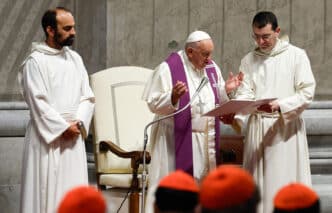PHILADELPHIA (OSV News) — A former Vatican doctrinal chief cast sharp criticism on the Synod on Synodality days ahead of the synod’s second and final session starting on Oct. 2.
German Cardinal Gerhard Müller spoke with OSV News briefly Sept. 28 as he wound down a three-week visit to the United States with a quick stop at a health care ethics seminar hosted by the National Catholic Bioethics Center in suburban Philadelphia.
“It is not a homogeneous assembly and therefore the canonical status of this assembly is not clear,” the cardinal said, because it is made up of not only bishops but also consecrated men and women and lay people.
Background on the synod
The worldwide Synod of Bishops takes place in Rome every three to four years with only bishops as voting members. In a decision formalized April 17, 2023, “the Holy Father approved the extension of participation in the synodal assembly to ‘non-bishops’ — priests, deacons, consecrated men and women, lay men and women.”
Pope Francis was scheduled to formally open the monthlong second session of the Synod on Synodality on Oct. 2. It ends on Oct. 27. The first synod session was held on Oct. 4-28, 2023.
Synod organizers said in mid-September this second session will include 368 voting delegates — 272 bishops and 96 non-bishops — and the vast majority are returning from the first meeting.
“It cannot be that all are giving counsel and speaking together and the pope remains as the only authority who decides according to his own parameters and not according to the revelation, the revealed Truth. That is the wrong perspective,” said Cardinal Müller, who was prefect of the Vatican Congregation (now Dicastery) for the Doctrine of the Faith from 2012 to 2017.
The Synod of Bishops on Synodality, called by Pope Francis starting in 2021, is a multiyear, multiphase series of meetings comprised of “listening, communion and participation.”
Controversial topics
Feedback from a wide range of baptized faithful has been given to Church decision-makers. Meetings have been held worldwide at the diocesan, regional and universal levels, with participants weighing in on multiple topics such as formation and evangelization, as well as controversial topics like ordaining women to the permanent diaconate and LGBTQ issues.
At a news conference on Sept. 16 to announce a pre-synod retreat and penitential liturgy, organizers emphasized the controversial topics would not be on the agenda this year but instead would be taken up by special theological study groups. Ten such study groups looking into 10 themes that include the controversial topics from part one of the Synod last year, are scheduled to present a report at the start of this year’s Synod. The deadline for their work is June 2025.
According to the Vatican, the sins confessed at the penitential liturgy will include: sins against peace; sins against creation; sins against Indigenous populations and migrants; the sin of abuse; sins against women, family and youth; the sin of “using doctrine as stones to be hurled”; sins against poverty; and sins against synodality or the lack of listening and communion.
Cardinal Müller’s scathing essay
In a scathing essay posted by the online German Catholic news site kath.net, Cardinal Müller criticized the planned liturgy, saying the list of sins “reads like a checklist of woke and gender ideology, somewhat laboriously disguised as Christianity, apart from a few misdeeds that cry out to heaven.”
In Philadelphia, Cardinal Müller, 76, told OSV News, “We must return to the Catholic hermeneutic that the revelation, once and forever, (is) given in Jesus Christ … and we have the orientation in the holy Scripture, the apostolic tradition and in the authority of the magisterium because of the apostolic succession, therefore we have also to resist against heterodox groups and thinkers who want to create a new church.”
NCBC President John Haas hosted the cardinal during his visit to Philadelphia, where he addressed the International Institute for Culture on the essential role of the magisterium for the faith and practice of Catholics. Haas has a role with the institute.
In remarks to Catholic bioethics students at the NCBC seminar, Cardinal Müller said that during his short time in the U.S. his “iPad all the time is coming in propaganda” with news of the presidential campaigns, including Republican Donald Trump’s stance on limits to abortion and Democrat Kamala Harris, a strong promoter of abortion, being “for poor people.”
“Abortion is not only one among different ethical questions, but is a basic question,” said the prelate. “Between death and life there is not a third reality. If you take away the life of a baby or of elder people by euthanasia, the rest of all human dignity is gone and you don’t need more, other rights.”








